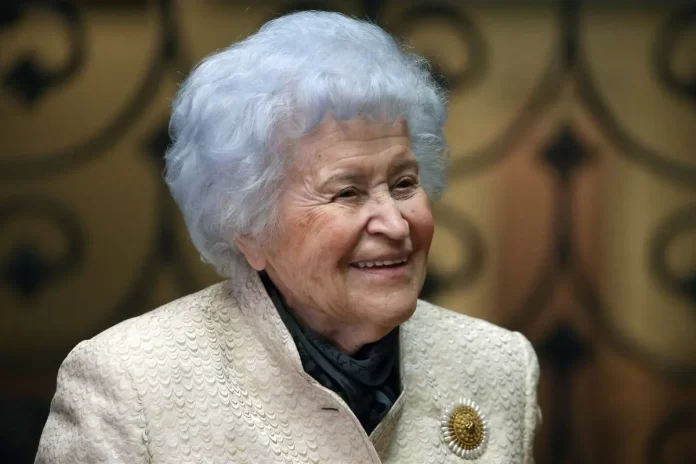Moscow, Dec 5 (The Street Press) – Irina A. Antonova, a prominent art historian who directed Moscow’s Pushkin State Museum of Fine Arts for over five decades, transforming it into a significant cultural establishment and using it to introduce external culture to isolated Soviet residents, passed away on November 30 in Moscow. She was 98.
The cause of death was heart failure exacerbated by a coronavirus infection, as confirmed by the museum.
Under Ms. Antonova’s leadership, the museum navigated the stringent and isolationist cultural policies of the Soviet Union and transitioned into the era following the collapse of Communism. In recent years, she oversaw the museum’s expansion into neighboring buildings, occasionally causing friction with their occupants, all to accommodate the growing number of exhibitions.
From the outset, Ms. Antonova channeled her boundless energy into establishing ties with the world’s premier museums. In 1974, she orchestrated the arrival of the Mona Lisa from the Louvre in Paris, drawing hundreds of thousands of eager viewers who queued up to witness the painting—unique queues that the Soviet government took pride in at the time. Recognizing that the country’s borders were sealed, many understood this might be their sole chance to encounter Leonardo da Vinci’s renowned artwork in their lifetimes.
Further exposing the Soviet populace to the global artistic scene, she presented an exhibition featuring 100 paintings from New York’s Metropolitan Museum of Art and the renowned “Treasures of Tutankhamen” exhibition.
During Ms. Antonova’s tenure, the Pushkin museum boldly showcased abstract and avant-garde creations from both Russian and international artists. This was a striking departure from a nation where an unsanctioned art exhibit was previously dispersed using a bulldozer. During a visit to a 1962 exhibition of emerging Soviet art, the country’s leader at the time, Nikita S. Khrushchev, famously exclaimed that certain abstract paintings resembled a “donkey’s tail” and claimed that even his grandson could produce superior work.
In 1981, the museum presented a groundbreaking exhibition titled “Moscow-Paris, 1900-1930,” which skillfully blended the works of French artists like Matisse and Picasso with key pieces from the Russian avant-garde of that era, featuring creations by Chagall, Malevich, and Kandinsky. The exhibit aptly demonstrated the harmonious integration of Russian artists into Western European artistic currents, even revealing instances where they contributed to shaping those very trends.
Benefiting from her lineage tied to the Bolshevik movement, Ms. Antonova possessed a pedigree that facilitated her negotiations with Soviet cultural authorities. Employing her charisma and sharp intellect, she successfully metamorphosed what had predominantly been a compilation of plaster casts of renowned sculptures into a comprehensive museum befitting a major capital.
In a documentary celebrating the museum’s 100th anniversary, Ms. Antonova mentioned that they could do things that weren’t possible elsewhere. She explained that banning was straightforward, requiring little effort, while they were fortunate to have the freedom to achieve things.
Following the dissolution of the Soviet Union, she persisted in her mission to bridge Russia and the global community by curating exhibitions featuring the works of artists such as Joseph Beuys and Alberto Giacometti.
Moreover, she undertook the task of unearthing art treasures that the Soviet Army had seized in Germany during World War II, concealing them within the museum’s storage facilities. Critics criticized her for proceeding cautiously and even for neglecting to acknowledge their existence. Ms. Antonova countered these criticisms by explaining that acting during the Soviet era would have been an insurmountable challenge.
Upon her passing, Russian President Vladimir V. Putin expressed his condolences and recognized Ms. Antonova’s deserving of both professional and public acclaim. He lauded her as a “dedicated expert, enthusiast, and educator” who had “served Russian culture with inspiration.”
Born in Moscow on March 20, 1922, Irina Aleksandrovna Antonova’s father, Aleksandr A. Antonov, rose from an electrician to the head of a research institute, while her mother, Ida M. Heifits, worked at a printing house.
In 1929, Irina and her family relocated to Germany, accompanying her father who had been assigned to the Soviet Embassy. For a span of four years, she resided there, becoming proficient in German and cultivating an appreciation for European culture.
Amidst the war, she pursued nursing training and tended to severely injured Soviet pilots within Moscow’s hospitals.
Having earned her degree from Moscow State University, she was dispatched to work at the Pushkin museum shortly before the war’s conclusion. Originating in 1912 from the patronage of affluent merchants, the museum welcomed her at a time when its edifice lacked heating, and its glass roof had been compromised by bombings.
In an interview, Olga L. Sviblova, a confidante and the director of Moscow’s Multimedia Art Museum, conveyed that Ms. Antonova’s profound conviction rested in the museum’s ability to transcend borders, whether temporal, geographical, or national, within the realm of culture and art.
According to Ms. Sviblova, Ms. Antonova upheld her beliefs throughout different times, including under Stalin, Khrushchev, Brezhnev, Gorbachev, and the three decades she spent in the new Russia.
In 1961, Ms. Antonova achieved a significant milestone by becoming the first female appointed as the museum’s director. She retained this position until 2013, when she assumed the role of president, relinquishing daily operational duties to focus on strategic advancements. Her collective engagement across various capacities spanned an impressive 75 years.
In the Soviet era, Ms. Antonova experienced the privilege of travel, yet the thought of departing culturally vibrant Italian cities often moved her to tears, cognizant that it could mark her final visit there.
During that period, collaborating with acclaimed Soviet pianist Sviatoslav Richter, Ms. Antonova initiated an annual series of concerts within the museum’s grand chambers each December. Named December Evenings, these concerts have maintained their status as highly coveted performances in Moscow.
Her spouse, the art historian Yevsey I. Rotenberg, passed away in 2011. She is survived by her son, Boris.
Marina D. Loshak took over as the museum director after Ms. Antonova. Marina mentioned that it’s difficult to picture the Pushkin museum without Irina Antonova.


